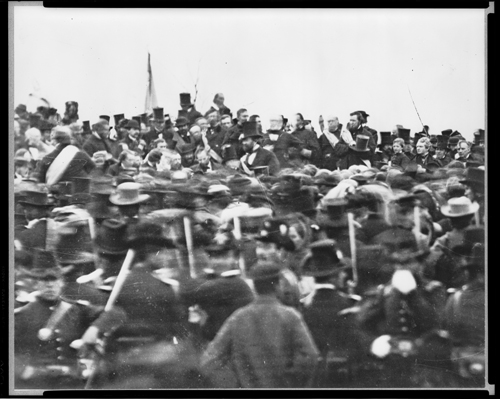Archive for November 19th, 2013
Daily Glimpse November 19, 2013
Posted by Joshua Sharf in PPC on November 19th, 2013
Daily Links From Glimpse From a Height
- Why We Still Read Lincoln
On the 150th of the Gettysburg Address, from Walter Berns of AEI: Of course, Lincoln did great things; greater than anything done by Wilson or Roosevelt, or Garfield, McKinley, and Kennedy; he freed the slaves and saved the Union, and because he saved the Union he was able free the slaves. Beyond this, however, it […]
November 19, 1863 + 150
Posted by Joshua Sharf in Civil War, History, National Politics on November 19th, 2013
Today is the 150th Anniversary of the Gettysburg Address. There will be a great deal written about the speech itself, so I’m going to take a slightly different tack.
In 1982, Jacques Barzun was invited to give the Annual Fortenbaugh Memorial Lecture, on the anniversary of the Address, to Gettysburg College. His topic was “Lincoln’s Philosophical Vision,” and he broke it down into three parts: everyday life, ethics and morals, and man’s place in the universe. I can’t find the whole speech online, but there is much in it that is relevant to today’s politics.
The fanatical temper on either side springs from the philosophy opposite to perspectivism – the philosophy of absolutism: according to it, once an important purpose has been adopted, nothing must stop its immediate carrying out – and damn the consequences. Such thinkers are proud of their “principle” and they forge ahead thinking it is the only principle in the case.
Lincoln was a man of principle, too, but he understood how to handle principles – in the plural – in a world of actuality. Just one year before the war broke out, he plainly told his first great audience in the east that he thought slavery wrong and that there was “no middle ground between the right and the wrong.” But he went on to say: “Wrong as we think slavery is, we can yet afford to let it alone where it is, because that much is due to the necessity arising from its actual presence in the nation; but can we, while our votes will prevent it, allow it to spread into the National Territories, and to overrun us here in these Free States?” Lincoln wanted to stiffen resistance against the compromisers such as Senator Douglas, who was “groping” for “sophistical contrivances” that would in the end perpetuate slavery.
The lesson here is to beware of what absolutists call principles. Principles necessarily take the form of abstract words… Such words…lack contents you can name, concrete reference to the world of fact and behavior. That is the reason why the great English writer Dorothy Sayers said, “The first thing a principle does is to kill somebody.” Her conclusion follows from the absolutist temper…Of such stuff are made the idealist, the crusader, the revolutionist. He not only wants instant gratification, but he is also ever-ready to believe that his opponents are wrong on purpose, knowingly and wickedly; he is incapable of saying with Lincoln, “the southerners are just what we would be in their situation.”
And, as importantly:
One more word must be said about pragmatism by way of introducing the second part of Lincoln’s philosophy. The word pragma, a Greek root, means “the thing done,” the upshot. Pragmatism therefore means the doctrine that all human thought is fundamentally directed at doing, at some desired action, now or in future. The pragmatic test asks: What concrete difference would it make if this idea or that idea, this policy or that policy, were taken as the true one? It is the test that mankind has used for thousands of years in accumulating what we call the truths of experience.
Lincoln was above all a practical politician, who wanted to work within the existing political system to effect change, but wasn’t willing to let its limitations be its demise. He was also one who sought to understand where the other guy was coming from, even as he understood the profoundly moral nature of politics.
The deep irony of the current age is that President Obama, who pretends to Lincoln’s mantle, has based his entire political outlook on believing that his opponents are wrong on purpose, knowingly and wickedly, and being willing to say so, loudly and longly.
At the same time, there’s a small but loud group of Republicans who reject Lincoln’s pragmatism in the name of principle, without realizing that life often consists of sorting out conflicting principles.
The anniversary of that short, profound, complex speech couldn’t come at a better time.




